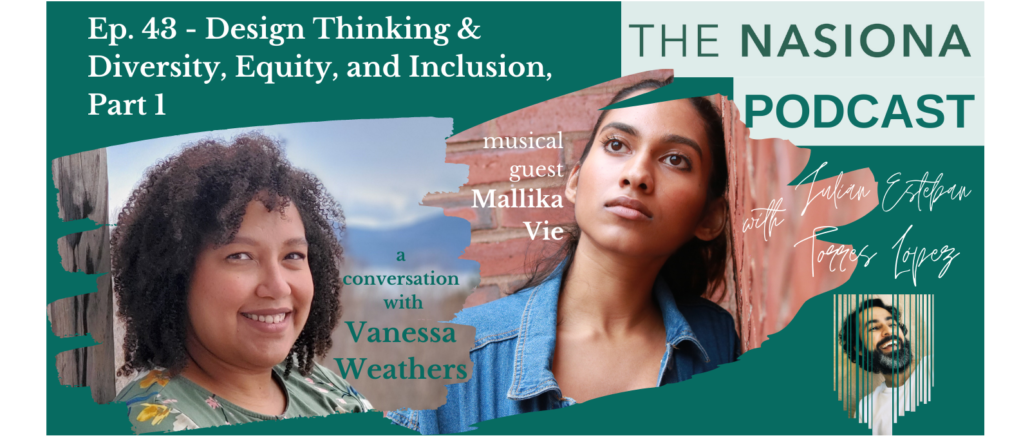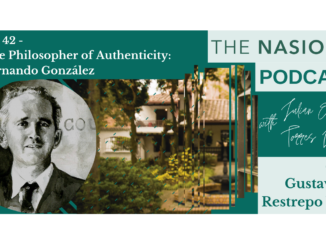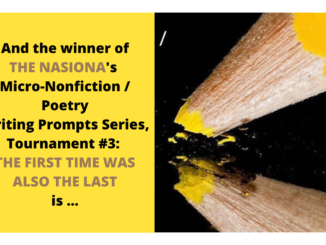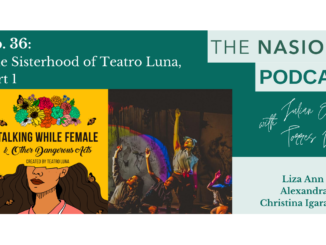
Listen to our 2-part conversation with Vanessa Weathers on The Nasiona Podcast‘s episodes 43 and 44 “Design Thinking & Diversity, Equity, and Inclusion,” which are both part of our Deconstructing Dominant Cultures Series.
Episode 43 – Design Thinking & Diversity, Equity, and Inclusion, Part 1
Episode 44 – Design Thinking & Diversity, Equity, and Inclusion, Part 2
You can also find our podcast episodes on Apple Podcasts, Spotify, iHeartRadio, Stitcher, or wherever you get your podcasts.
Most environments are not designed to include and value everyone, and as a result such designs fail to center the concerns of those in the bottom rungs of our class and caste systems. So, if we really want to value and include everyone in our teams, in our communities, in our societies, in our politics, then we have to be intentional in the way we design our worlds. We must be intentional in the way we invent environments and opportunities so we may create different relationships with the self, with the other, with our environments, with our work, and with our life activities.
This is where design thinking comes in. How do we create new environments that may assist in valuing, centering, elevating, amplifying, and including those whose concerns have traditionally been left out of the ways we have designed our workplaces, our institutions, and our communities.
In today’s episode, I speak with Vanessa Weathers, Founder & Principal Consultant at Conscious Employee Experiences, to further explore design thinking and its relationship to diversity, equity, and inclusion (DEI).

Vanessa Weathers is an experience designer who has spent nearly 20 years guiding and coaching leaders on becoming more human centered. She uses ethnographic techniques and journey mapping to bring visibility to the people and the issues often overlooked and ignored by dominant cultures. She is an activist, a futurist, and a pioneer who is passionate about the future of work and fostering inclusive work environments. She has dedicated her life to fighting for justice for the marginalized, which has been fueled by her own personal experiences of being in the minority in many aspects of her identity. Having always felt like an “outsider” in corporate America, she is currently embarking on her own journey of self-exploration and continuing to leverage her background in human centered design and diversity, equity, and inclusion to shift attitudes around equity in the workplace.
Vanessa Weathers and I spoke on August 22nd of 2020. What follows is the first of my two-part interview with Vanessa, where we introduce what design thinking is and how we can apply it DEI work. Specifically, we explore the importance of intentionally designing environments to cultivate inclusion, growth, and flourishing for different individuals and communities. We also critique the desire to build teams and societies based on cultural fit, and we dissect the difference between managers and leaders.
But before we jump into the conversation, Aïcha Martine Thiam and I introduce you to The Nasiona Music Series. Starting today, we will begin every episode by showcasing a BIPOC musical artist from our series, which you can explore at TheNasiona.com. Today’s musical guest is Mallika Vie, and she performs her track “Bluebells Still Grow,” which you can find in The Nasiona‘s compilation BIPOC musical album, Volume 1: Petrichor.
MUSICAL GUEST
Mallika Vie is a soul and R&B singer, songwriter, and producer from Boston, MA. In 2020, Vie released her ’60s soul-inspired debut single, “Be Still For Me”, and her 2-song pop-soul EP, “Since My Baby Said Goodbye”. Her influences include alternative R&B powerhouses like Joy Crookes, Solange, and Snoh Aalegra.
Instagram: @Malliva.Vie
Spotify
HOST
Julián Esteban Torres López (he/him/his/él) is a bilingual, Colombia-born culture architect with Afro-Euro-Indigenous roots. For two decades, Julián has studied systems of oppression and has worked toward humanizing those who have been socially, politically, and geographically excluded from the hierarchies of power by centering, elevating, and amplifying their voices, experiences, and histories. He is the founder of the social justice storytelling organization The Nasiona, where he also hosts and produces The Nasiona Podcast. He’s a Pushcart Prize and Best Small Fictions nominee, a Trilogy Award in Short Fiction finalist, and the author of Marx’s Humanism and Its Limits and Reporting On Colombia. His work appears in PANK Magazine, Into the Void Magazine, The Acentos Review, among others. Julián holds a bachelor’s in philosophy and in communication and a master’s in justice studies from the University of New Hampshire and was a Ph.D. candidate at the University of British Columbia Okanagan, where he focused on political science and Latin American studies.
The Nasiona Podcast amplifies the voices and experiences of the marginalized, undervalued, overlooked, silenced, and forgotten, as well as gives you a glimpse into Othered worlds. We focus on stories that explore the spectrum of human experiences—stories based on facts, truth-seeking, human concerns, real events, and real people, with a personal touch. From liminal lives to the marginalized, and everything in between, we believe that the subjective can offer its own reality and reveal truths some facts can’t discover. Hosted, edited, and produced by Julián Esteban Torres López.
Please follow The Nasiona on Twitter, Instagram, and Facebook for regular updates: @TheNasiona
Thank you to Aïcha Martine Thiam for co-producing the Music Series component of the episode, and to Mallika Vie for being our first musical guest.
Original music for The Nasiona Podcast was produced by the Grammy Award-winning team of Joe Sparkman and Marcus Allen, aka The Heavyweights.
Joe Sparkman: Twitter + Instagram. Marcus Allen: Twitter + Instagram.The Nasiona Magazine and Podcast depend on voluntary contributions from readers and listeners like you. We hope the value of our work to our community is worth your patronage. If you like what we do, please show this by liking, rating, and reviewing us; buying or recommending our books; and by financially supporting our work either through The Nasiona’s Patreon page or through Julián Esteban Torres López‘s Ko-fi donation platform. Every little bit helps.
Thank you for listening and reading, and thank you for your support.





2 Trackbacks / Pingbacks
Comments are closed.